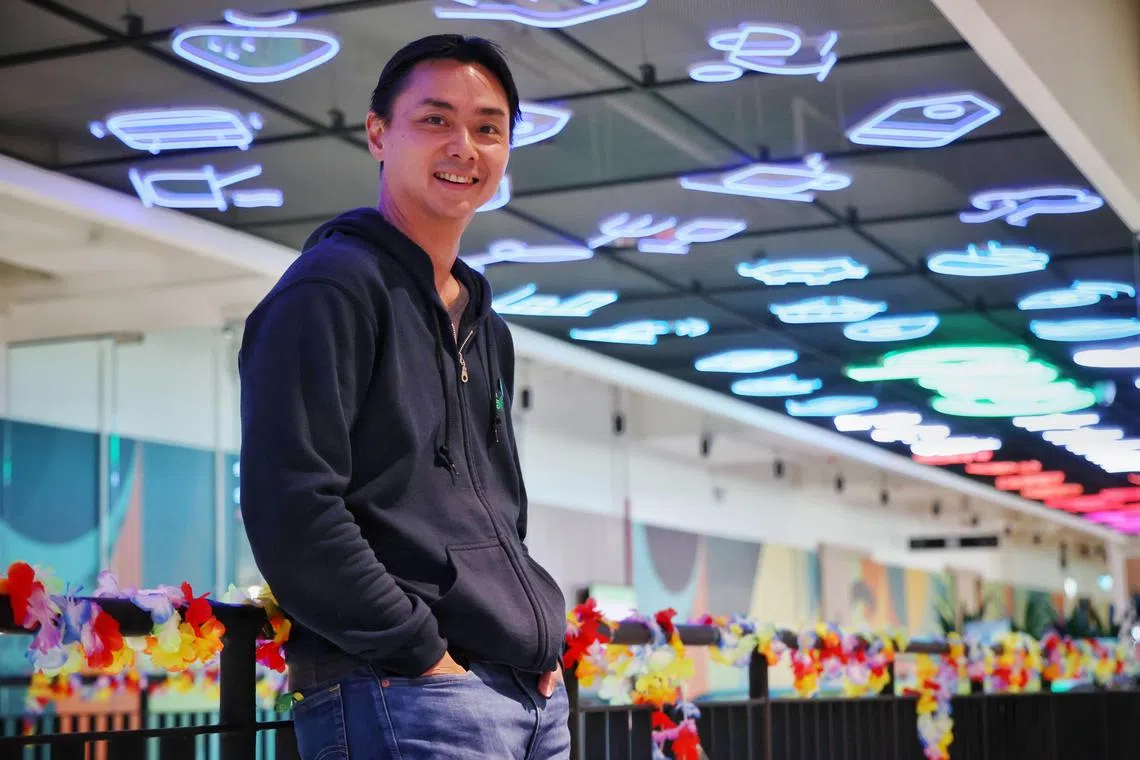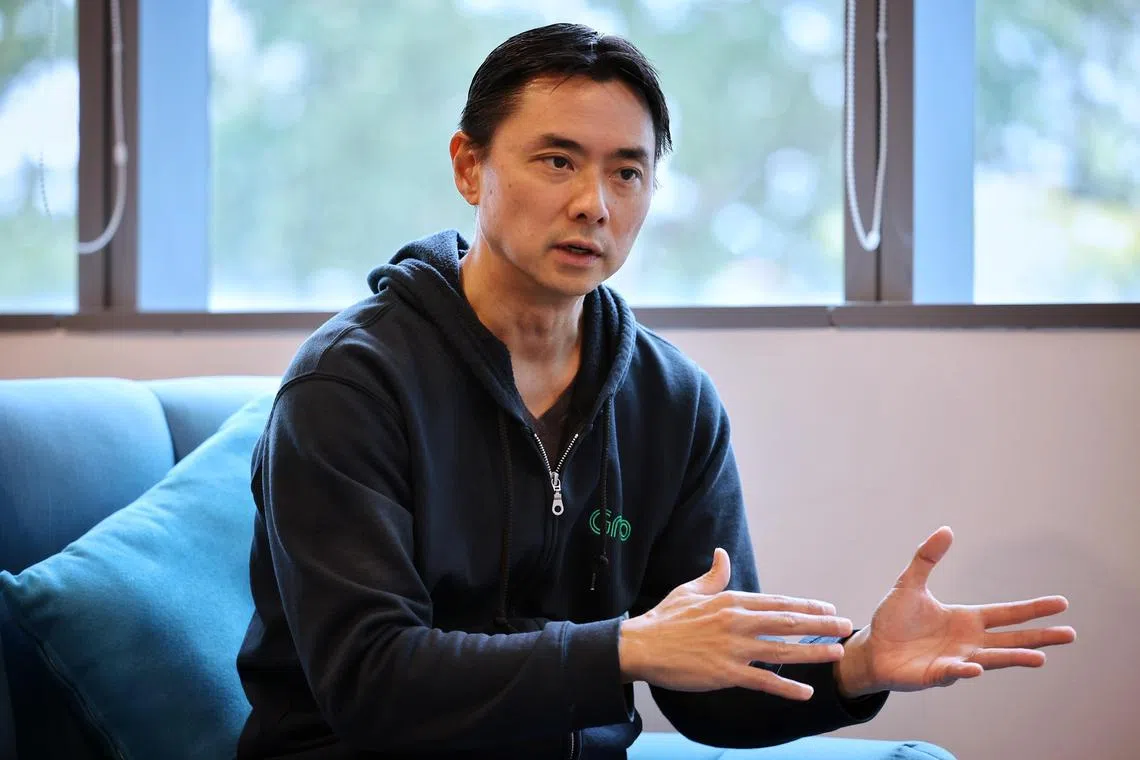Affordable fares a focus for Grab in 2024, plans to improve ride-sharing and carpooling services
Sign up now: Get ST's newsletters delivered to your inbox

Grab Singapore managing director Yee Wee Tang said the firm has plans to improve its ride-sharing service GrabShare and carpooling service GrabHitch.
ST PHOTO: JASON QUAH
Follow topic:
SINGAPORE - Keeping fares affordable, boosting driver income and improving service reliability will be key focuses for ride-hailing giant Grab in 2024, said its Singapore managing director Yee Wee Tang.
After largely tackling a driver supply crunch that drove fares to eye-watering levels in 2023, the Nasdaq-listed company has now found “a good balance”, Mr Yee told The Straits Times in an interview.
“There are obviously segments who say the fare is too high, and some drivers will say it is too low... I think we have found a good spot from our point of view,” he said.
However, the 47-year-old, who has been helming Grab’s operations in the city-state since 2019, acknowledged that fares are still high when there is rain or major events due to surge pricing.
Hence, the company has plans to improve its ride-sharing service GrabShare and carpooling service GrabHitch, which Mr Yee said are lower-cost options.
Grab is also trying to be smarter in how it deals with situations that lead to a big surge in fares. For instance, it is looking at possibly incorporating weather forecasts into its app to better direct drivers during downpours.
Mr Yee said efforts to lower fares in 2023 may have led to lower income for some drivers, so the aim in 2024 is to improve or at least protect their earnings.
He defended the changes made in late 2023 to Grab’s commission structure
Instead of a fixed rate, Grab drivers are charged a commission that changes based on the distance travelled and time taken to pick up passengers.
To boost the adoption of GrabShare, which is still in beta mode more than a year after it was relaunched, Grab will have its app display the estimated travel time for shared rides.
It is also exploring a feature that will inform users waiting to get a ride about a potential GrabShare match in their area.
Grab said the biggest reason passengers do not use the service is that they do not know how much longer it would take to reach their destinations compared with a regular ride. By addressing this, the hope is more will give it a try.
When asked, Mr Yee declined to reveal the current take-up for GrabShare. He would only say the take-up rate is “quite healthy” and that the company is “nearly there in terms of percentage of rides”.
The use of GrabHitch, however, has not grown much, and the product needs a revamp, Mr Yee added.
To encourage more drivers to carpool, improvements will be made to help them find a GrabHitch passenger faster, Grab later said, without elaborating.
Separately, a feature to help passengers hail a ride faster will be tested with a small group of Grab users next week and rolled out to all Singapore users in February if the experiment is successful.

Mr Yee said efforts to lower fares in 2023 may have led to lower income for some drivers, so the aim in 2024 is to improve or at least protect their earnings.
ST PHOTO: JASON QUAH
The new feature allows Grab users to select multiple service types when booking a ride, so they can search for a driver across the different services simultaneously.
Changes are also being made to Grab’s advance booking service, matching drivers to bookings earlier, so it is more dependable.
The current system does this within an hour of the scheduled pickup, leaving little buffer if no driver can be found, Mr Yee said.
Grab’s plans in 2024 take place amid antitrust concerns that have caused the company’s deal to acquire Singapore taxi firm Trans-cab to stall, as well as the Government’s ongoing review of the taxi and ride-hailing sectors.
Asked about the review by the Land Transport Authority, Mr Yee said it is good that the agency is giving the taxi and ride-hailing sectors another look.
“We are very concerned about reliability, which is core to our business. How do we ensure there are sufficient drivers and cars? We do think it’s important to look at that,” he said.
Mr Yee hopes the review will lead to ride-hailing becoming more inclusive, noting how young families face issues when booking private-hire cars, as drivers need to have two different child seats to cater for children of different heights.
Grab will also need to comply with a new set of policies kicking in from the second half of 2024 that will grant employee-like levels of work injury compensation insurance and Central Provident Fund contributions to its drivers and deliverymen.
He said Grab is supportive of the added protections for gig workers, but there are details yet to be finalised. A concern is whether administrative costs will skyrocket as a result.
Mr Yee noted that any additional costs, which “can be substantial if we don’t do it right”, will need to be shared.
There is the likelihood that a sizeable chunk of this will be passed on to consumers.
Grab, he said, is trying to reduce the extra costs with the use of technology, though he did not provide specifics.
In the food delivery space, Grab is also looking to cut costs, for the company and customers, as it continues to gain market share.
One way is to batch more orders together, which lowers the delivery fee and increases productivity for delivery riders, and Grab is looking to introduce a group-order feature, Mr Yee said.
With flagging demand and merchants grappling with labour shortages, the company is closing its two remaining cloud kitchens in Hillview and Jurong, pending ongoing negotiations with the landlord and those affected.
Meanwhile, the company is shifting focus towards dine-in restaurants, by allowing users to buy vouchers on the app that they can use at bricks-and-mortar outlets.
Mr Yee expects ride-hailing demand to continue rising in 2024, citing a projected increase in tourist arrivals, the line-up of concerts and major events, and more workers returning to offices.
Noting that the number of private-hire vocational licence holders has climbed more than 10 per cent since January 2023, he said supply is returning and Grab will roll out more productivity tools to help drivers earn more and meet the growing demand.
But it is not all rosy and there are still issues to resolve.
“We do find supply challenging at night. After 9pm, we still have supply shortages,” Mr Yee added.


